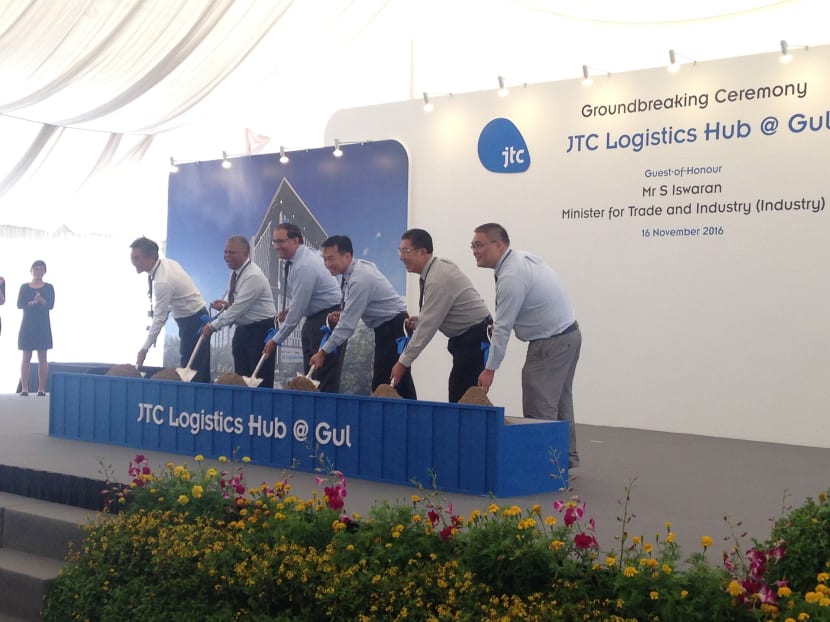2,000 jobs in pipeline for transformed logistics sector
SINGAPORE — A blueprint to transform the logistics industry — by tapping on technology and co-locating firms in state-of-the-art facilities, among other initiatives — will add 2,000 new jobs for PMETs (professionals, managers, executives and technicians) by 2020.
SINGAPORE — A blueprint to transform the logistics industry — by tapping on technology and co-locating firms in state-of-the-art facilities, among other initiatives — will add 2,000 new jobs for PMETs (professionals, managers, executives and technicians) by 2020.
The latest industry transformation map (ITM) under a national programme, which was first announced in the Budget earlier this year, was launched on Wednesday (Nov 16) by Minister for Trade and Industry (Industry) S Iswaran at the groundbreaking ceremony for JTC Logistics Hub @ Gul.
The logistics industry is a critical enabler of Singapore’s economy. Last year, the transportation and storage sector — which includes logistics — contributed 7.4 per cent to Singapore’s gross domestic product and employed more than 230,000 workers.
The transformation of the logistics sector is expected to achieve a value-add of S$8.3 billion for the economy by 2020.
“The logistics ITM will support enterprise level efforts to transform and grow through productivity and innovation. It aims to nurture a strong Singaporean core through talent development. This in turn will help our companies, in particular the SMEs, to scale up and internationalise. Our trade associations will be keenly involved as change agents to help amplify the reach and impact of the ITM,” Mr Iswaran said.
Some of the initiatives include directly supporting companies to tap on suitable process methodologies and technologies. For SMEs, the Government will invest in next generation facilities that encourage the co-location of companies.
“The transformation of the Singapore logistics industry brings with it exciting opportunities for its workforce. Rank and file jobs will require more skills, while new professional roles will also emerge,” noted Mr Iswaran.
Businesses will need more PMETs to look after operations and business development as they tap on Asia’s growth to expand. While these jobs already exist, the requisite skillsets are expected to become more sophisticated with trends such as the rapid advent of technology, the growth in data analytics and globalisation.
There will also be specialist roles created as logistics businesses adapt to emerging business trends and advancements in technologies, and individuals skilled in developing automation systems for logistics, data analytics experts, as well as robotics coordinators could see an increase in demand over the next few years.
Through a logistics professional conversion programme conducted by Workforce Singapore, the Government aims to help people make a smooth switch mid-career into the industry. Workforce Singapore will also help workers already in the industry to acquire niche and emerging skills.
By mid-2017, the Government will launch the skills framework for logistics, which will serve as a guide for individuals and companies on the career pathways, job roles, requisite skills and wages in the sector.
These changes come as the logistics industry globally enjoy good growth, in spite of the current challenging economic climate. A growing middle class in Asia, an increasing network of trade agreements in the region as well as Singapore’s central location, will only serve to bolster the sector even further.
“It is a sector with opportunities because of Asia, technology change and because of where we are starting from given our ecosystem, logistics and location. But we have to do some work in order to take advantage of those opportunities. And if we do it right, there will be a reasonable increase in value add,” Mr Iswaran said.
“It is important that our companies/SMEs are well prepared for it, if necessary to choose to specialise in certain areas and it is also important for our people to be well-prepared for those jobs,” he added.







